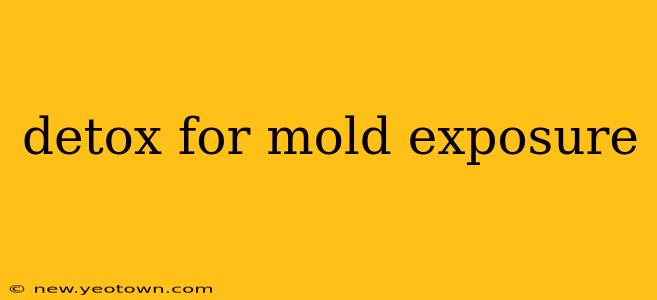Mold exposure can leave you feeling unwell, triggering a cascade of symptoms that range from mild irritation to serious health problems. While professional mold remediation is crucial to tackling the source of the problem, supporting your body through a detox process can significantly aid your recovery. This isn't a quick fix; rather, it's a holistic approach focusing on gently assisting your body's natural detoxification systems. Think of it as providing your body with the tools it needs to heal itself after encountering a significant environmental toxin.
My name is Dr. Evelyn Reed, and I've spent years researching the impact of environmental toxins on human health. This guide draws on my experience and the latest scientific understanding of mold-related illness and detoxification. Remember, this information is for educational purposes only and shouldn't replace professional medical advice. Always consult your doctor before starting any new detox program, especially if you have pre-existing health conditions.
What are the Symptoms of Mold Exposure?
Before diving into detoxification, let's understand what mold exposure might be doing to your body. The symptoms are incredibly varied, and their severity depends on factors like the type of mold, the level of exposure, and your individual sensitivity. Common symptoms include:
- Respiratory issues: Coughing, wheezing, shortness of breath, nasal congestion, and throat irritation.
- Allergic reactions: Sneezing, itchy eyes, runny nose, and skin rashes.
- Neurological symptoms: Headaches, brain fog, fatigue, dizziness, and difficulty concentrating.
- Gastrointestinal problems: Nausea, vomiting, diarrhea, and abdominal pain.
- Other symptoms: Muscle aches, joint pain, and unexplained fevers.
How Does Mold Affect the Body?
Mold produces mycotoxins, potent compounds that can interfere with various bodily functions. These toxins can disrupt the immune system, trigger inflammation, and damage cells. The body's natural detoxification pathways – the liver, kidneys, and lymphatic system – work tirelessly to eliminate these toxins, but overwhelming exposure can overburden these systems.
What is the Best Detox for Mold Exposure?
There's no single "best" detox, as the ideal approach is personalized. However, a multi-pronged strategy focusing on supporting your body's natural detoxification processes is generally recommended. This often involves a combination of the following:
1. Supporting Liver Function:
The liver plays a crucial role in filtering toxins from the blood. Supporting its function is paramount. This can be achieved through:
- A healthy diet: Emphasize fruits, vegetables, and whole grains. Limit processed foods, alcohol, and refined sugars.
- Liver-supporting nutrients: Milk thistle, turmeric, and artichoke extract are often recommended. Always consult your doctor before using supplements.
2. Boosting Lymphatic Drainage:
The lymphatic system helps remove waste and toxins from the body. Gentle activities like light exercise, yoga, and dry brushing can stimulate lymphatic flow.
3. Hydration:
Drinking plenty of clean, filtered water is crucial for flushing out toxins.
4. Binding Agents:
Certain substances can bind to mycotoxins in the gut, aiding their elimination. These include activated charcoal and zeolite. It’s crucial to consult with a healthcare professional before using these, as they can interact with medications.
5. Nutritional Support:
A well-balanced diet rich in antioxidants and nutrients supports the body's overall detoxification capacity. Focus on nutrient-dense foods, and consider consulting a registered dietitian or nutritionist for personalized guidance.
What are the Natural Remedies for Mold Exposure?
Many natural remedies are believed to support detoxification after mold exposure. However, it's essential to approach these with caution and consult a healthcare professional before incorporating them into your routine. Examples include:
- Chlorella: A type of algae known for its ability to bind to toxins.
- Cilantro: Some believe it helps chelate heavy metals, though more research is needed.
- NAC (N-acetyl cysteine): An antioxidant that supports glutathione production, a crucial detoxifying agent.
How Long Does it Take to Detox from Mold Exposure?
The time it takes to detox varies significantly from person to person. It depends on factors such as the severity and duration of exposure, individual health status, and the chosen detoxification strategies. The process might take weeks, months, or even longer in some cases.
Can You Detox from Mold on Your Own?
While self-detoxification is possible, it's crucial to remember that mold exposure can have serious health implications. Professional guidance from a healthcare provider is essential, particularly if symptoms are severe or persistent.
When Should You See a Doctor After Mold Exposure?
You should seek immediate medical attention if you experience severe respiratory distress, allergic reactions, or other concerning symptoms after suspected mold exposure. Regular check-ups with your physician are also recommended throughout the detoxification process.
Remember, detoxification after mold exposure is a journey, not a race. By adopting a holistic and patient approach, focusing on supporting your body’s natural processes, and seeking professional guidance when needed, you can significantly improve your chances of recovery.

